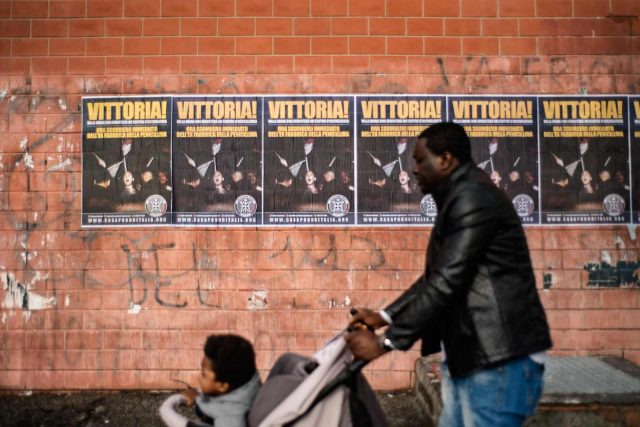The Writer: Caitlyn L.Chandler
Date first published: 28 January 2018
The penicillin factory is a sprawling, abandoned complex on the outskirts of Rome. The first thing I noticed when Italian photographer Maurizio Martorana and I visited in November 2018 was the trash. Stacks of T-shirts, juice cartons, plastic plates, clothes racks, and bicycle parts. A path led through a series of buildings, and against every wall was a makeshift shack. At the time, some 500 people, the majority of them African migrants and refugees, lived there amid the debris.
The second floor of the factory was covered with shit—with no working plumbing, people had nowhere else to defecate. The street-side windows looked out on a tennis club. Throughout the grounds were small shops selling beer, toothpaste, and basic cooking supplies. The ground was muddy and contained chemicals and asbestos leftover from the factory’s manufacturing days.
Over the past year, depending on your perspective and politics, the penicillin factory had become either proof that there were too many foreigners in the country or a symbol of the country’s failure to respond humanely to migrants. During the day, a fascist group called CasaPound marched outside protesting, while at night, health outreach vans run by aid groups provided medical services.
Across Italy, some 10,000 migrants and refugees are living in squats. In search of shelter, many have joined vulnerable Italians in
in occupying empty buildings. The housing crisis is not an accident. It is part of a deliberate strategy by the government to make Italy as inhospitable to migrants and refugees as possible.
On December 10, 2018, Matteo Salvini, the deputy prime minister and interior minister belonging to the far-right party the League, stood outside the factory as police entered and cleared it of residents. CasaPound, which had led a public campaign for the eviction, celebrated. But the paradox is that they themselves are squatters. CasaPound took over an empty office building in the center of Rome in 2003 and has housed people there ever since. This incongruence, between the penicillin factory eviction and inaction against CasaPound, is another example of how Italy’s far right is increasingly driving public opinion and policy on immigration. In late November, Salvini’s government passed a new law called the Security and Immigration Decree, but referred to by almost everyone in Italy as the “Salvini Decree.” It radically changed the Italian asylum system; eliminating the category of “humanitarian protection,” a form of protection given to people who are deemed to have “serious reasons” to flee their home country and cannot be deported. Since 2008, some 120,000 asylum-seekers in Italy have received this status.
Although immigrants comprise only 8 percent of Italy’s population, Salvini rails against
“the invasion” and has blocked rescue ships from landing at Italian ports (“porti chiusi,” he likes to brag on Twitter and Instagram, meaning “harbors closed”). Despite the fact that, since 2014, the share of crimes committed by foreigners is decreasing within every single region in Italy, anti-immigrant sentiment, stoked by Salvini’s government, is at a dangerous, all-time high.
*
Italy’s current populist government came to power in March 2018. It is an unusual coalition between Salvini’s the League, which ran on a platform of “prima gli italiani,” or “Italians first,” and the anti-establishment Five Star Movement, led by Luigi Di Maio; the latter had never held national office.
The League, formerly the Northern League, used to call for the state of Padania to secede from Italy. A few years ago, it revamped itself as a nationalist party that was against immigration (during the election campaign, Salvini pledged to deport 500,000 migrants), the European Union, and austerity policies. The Five Star Movement, founded in 2009 by Italian comedian Beppe Grillo, also capitalized on growing discontent against traditional political parties with an eclectic platform of ideas pulled from across the political spectrum, such as advocating for a universal basic income and questioning Italy’s participation in the eurozone.
When we visited, a recent kitchen fire in one of the rooms had cut the electricity supply, and people gathered in the lobby to connect their phones to portable chargers. Outside, kids rode their bicycles around the parking lot as dusk fell. Abay, thirty-two, has lived in the four star hotel with her family for six years. Abay is Ethiopian and her husband is Eritrean; they met in Khartoum, Sudan, and came to Italy together in 2008. Their children—Amen, six, and Kirubel, two—were born in Rome. Abay and her partner have political asylum, and while Abay works thirty-six hours a week as a hotel housekeeper making six euros an hour, she and her husband can’t scrape enough together for rent after the supermarket where her husband worked shut down. Without the squat, they would be homeless.
Before the election, the Five Star Movement said it would never form a coalition with the League because it was too far to the right. (Italy essentially has a proportional representation system, whereby parties need to form a coalition after the election if one party does not have a substantial majority of votes.) However, after an attempt to form a government with the center-left Democratic Party failed, the Five Star Movement proceeded to do exactly that. Although Five Star initially had more public support, with 32 percent of the vote compared to the League’s 17 percent, it has proved inept at governing, and over the past few months has lost many of its left-leaning voters. Meanwhile, the more experienced League has overtaken Five Star in popularity, as its base responds to Salvini’s anti-immigration stunts. By November 2018, support for his party had jumped to 34 percent.
The rise of the far right was not sudden in Italy, where the 2008 global financial crisis and subsequent economic slowdown was particularly severe. Under Silvio Berlusconi, the billionaire media tycoon who served as Italy’s prime minister four times, Italy borrowed large sums to stem the crisis’s effects; public debt leapt from an already sizable 103 percent of GDP in 2007 to nearly 127 percent by 2012. Proving inept at handling the crisis, Berlusconi was forced out in 2011—but not before he had paved the way for Salvini by forming coalitions with the League when he was in office and calling migrants a “time bomb.”
After Berlusconi, the government of Mario Monti, a former European commissioner, ushered in austerity measures such as cutting social spending and raising taxes. The effect on many Italian households was stark. The relative poverty rate crept upward, from 13.6 percent in 2008 to 15.8 percent in 2012, while household consumption plummeted to 1997 levels. As in much of Southern Europe, rising inequality and resentment of ongoing austerity measures—viewed by many as externally imposed by leaders in France and Germany—fueled populist sentiment and euroskepticism. The government failed to address growing resentment among the public.
Now Salvini has made attacking refugees and migrants a cornerstone of his politics (he also goes after feminists, gay people, journalists, and leftists, or “ticks,” the term used by Salvini). At the same time, Italy has seen a resurgence of support for fascism. Fascist ideology, always simmering on the margins of Italian politics, has acquired a growing respectability in political debates as a plausible alternative.
CasaPound, whose name references the pro-Mussolini American poet Ezra Pound, is a political party that calls its members “fascists of the third millennium.” It has proved adept at attracting young Italians, opening centers across Italy where young people can play sports, party (they throw raves), and hang out. The party claims poor and middle-class Italians have been left behind by a supposed preferential focus on migrants, provides social services in disadvantaged areas, and protests for housing rights. CasaPound’s supporters are predominately male and young. They are adamantly against a multiracial society and groups that advocate for human rights.
CasaPound does not have any representatives in parliament, and only holds local elected office in Ostia, a suburb of Rome. But its membership is expanding, and the group has a growing presence on college campuses. As of 2017, CasaPound had 20,000 members and 110 centers across the country, and many credit its media-savvy tactics with pushing the government farther to the right. Although Salvini has tried to distance himself from the group since ascending to power, he has a history with the organization. In 2014, the Northern League and CasaPound created a movement called Sovereignty to mobilize CasaPound’s supporters to vote for the League; there are pictures of Salvini dining with CasaPound leaders in 2015.
Casa Pound is one of several neo-fascist groups in Italy; others like Avanguardia Nazionale and Forza Nuova have been around longer. All of these groups have exploited the issue of migration to bolster their supporters.
From 2014 to 2017, some 624,747 people arrived in Italy on boats from North Africa, the majority crossing from Libya and coming from countries like Eritrea and Sudan, as well as, increasingly, West Africa. Under the previous center-left government, Italy poured money into the Libyan coast guard to block boats from crossing; in 2018, only 23,370 asylum-seekers arrived by sea. The drop is not because fewer people are leaving their countries, but because they are now increasingly intercepted en route by the Libyan coast guard, and then trapped in Libyan detention centers, where they are often tortured and sometimes sold to traffickers. Last year, at least 1,311 people drowned trying to reach Italian shores.
Salvini and his party stoke fears around migration by portraying migrants as criminals. Over the past ten years, overall crime has decreased in Italy by 8.3 percent, and crimes committed by foreigners have also fallen, with convictions at an all-time low. But each time a crime occurs in an immigrant neighborhood or when non-Italian citizens stand accused, Salvini exploits it. Such was the case with the brutal rape and murder of a sixteen-year-old girl, Desirée Mariottini, in a squat in San Lorenzo, an immigrant neighborhood in Rome. Two Senagalese men, one Nigerian man, and one Ghanaian man were arrested in connection with her assault and death. Salvini visited San Lorenzo and laid a rose at her memorial, then said he would come back with a bulldozer.
The Italian public grows ever more fearful. In a 2018 study, over half of Italians greatly overestimated how many migrants were in the country. Meanwhile, in the two months after Salvini became interior minister, Italian civil society groups recorded twelve shootings, two murders, and thirty-three physical assaults against immigrants.
*
There are roughly 100 squats in Rome spread across the city. These vacant hotels, offices, warehouses, and apartment buildings host an estimated 12,000 people. Many poor Italians lack stable accommodations; some 12,000 families are on the waitlist for public housing. Some of the squats are well organized by community or leftist political associations such as the Metropolitan Precarious Blocks, which also advocate for reform of housing laws.
One of the squats supported by Metropolitan Precarious Blocks is a former hotel in Tor Sapienza that currently houses some 500 people, including 150 children, many of whom attend local schools. Called “the four-star hotel,” its residents are from Africa, South America, and Eastern Europe; the majority have been living legally in Italy for years. Some found themselves homeless after the 2008 financial crisis, when many people lost their jobs and were unable to pay rent, resulting in evictions. The hotel was occupied in 2012; since then it has been carefully maintained by residents, and the rooms resemble mini-apartments.
For more information follow this link: https://www.nybooks.com/daily/2019/01/28/rome-where-migrants-face-eviction-while-fascists-find-a-home/
Source: NYR Daily










